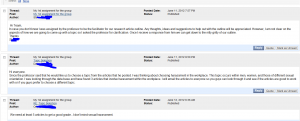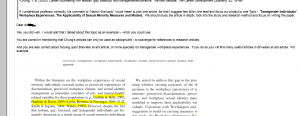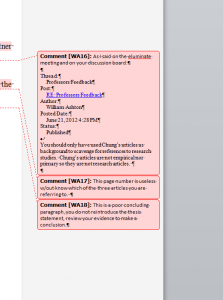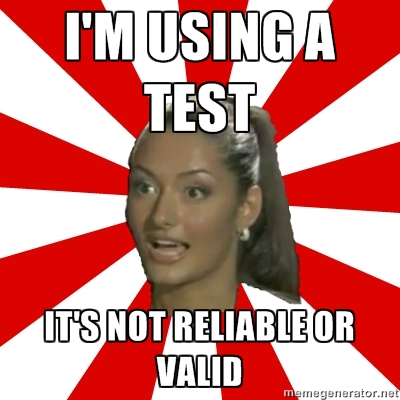When I started this blog last month, I thought it would be … things I say to my blackboard students. However, I’m working on a new class — which is not an online class — which uses other instructional technology. I will blog about that here.
I’m teaching a new class (for me) this fall which hasn’t been taught for several years. It’s Psych 252 – consumer behavior. I’ve been thinking about my approach to the class for a month and really haven’t had anything gel about the structure of the class. Coincidently, I was called up for grand jury duty, which in Queens County means 9:30 AM to 5pm, five days a week for four weeks! Most of the time is spent sitting in the jury room (without any internet access!) waiting for cases. This has given me the opportunity to catch up on what was saved to my mp3 player. One podcast which I had on my player for a while but haven’t been able to listen to (most of my listening is done on the subway and this podcast’s volume is too low) is a lecture by Jim Groom (U. of Mary Washington) on his and UMW’s use of pubic blogs in classes.
I starting thinking about the idea of a public blog assignment for my upcoming Consumer Behavior course. One goal I had in mind for my course was to somehow get students to look at advertising during the course. Asking them to create and maintain blogs on advertising would be a great way to meet this goal. Another goal was to create a course different than all of the others I’m teaching. In all of my existing courses I’ve focused upon semester projects which are based on designing experiments or review the scientific literature. While this is an important skill for our majors, I’m kinda’ burned out this. Also, these assignments in my other classes usually produce the need for me to give feedback on proposals which is an exhausting process. I’ve scheduled the first drafts for my research methods and social psychology courses not to overlap and I feel that it would be too difficult to schedule in a third 2-week period of responding to proposals. And, after thinking about the procedure, I realized that the blog would meet a third goal: making my students understand how to use the internet to make money. An NPR report [I can’t find the link] said that one reason why we have a widening wealth gap in the US is because schools — for the first time in a century — are not teaching students the skills that they need to get jobs using the new technology. Blogging? Yes! The Huffington Post was just bought for $312. Using Bb teaches students to be consumers of online content, but not creators nor sellers of online content. Finally, this would force my students to write often which is something that they need to do.
The lack of wi-fi in the jury room has one blessing. I have long periods of time with my laptop and no internet to distract me. I’ve hammered out a draft of the grading rubrics of the blog assignment.
———————————————————
Rubrics
Orthogonal Rubrics (set weight regardless of other rubrics)
Category: Regularity Weight: 15%
High (100 points) – published schedule (e.g. Mondays; M/W/F; M-F) adhered to
Nominal (85 Points) – posts are spread out equally over the semester [24 posts divided by 12 weeks = 2 per week; are your 24 posts about 2 per week?]
Medium (55 Points) – posts are generally spread out equally over the semester but 4 or 5 weeks have lower than normal number of posts and 4 or 5 weeks have more than normal
Low (0 Points) – posts are bunched up at the end of the semester
Category: Readability/Writing Weight: 10%
High (100 points) – You can be proud that your post is on the internet for everyone to see
70 Points – Up to 3 typos or misspellings per 100 words
Low (0 Points) – reading your post aloud makes you sound like this http://www.youtube.com/watch?v=Ll-lia-FEIY&
Category: Reoccurring Themes Weight: 10%
High (100 points) – All posts are tagged. You refer to previous posts in the theme (to discuss the theme).
80 Points – Your tags make sense and you refer to the themes represented by the tags in your post (to discuss the theme)
Medium (55 Points) – all of your posts are tagged and you have fewer than 10 tags
Low (0 Points) – posts are not tagged
Category: Comments Weight: 25%
High (100 points) – A total of over 50 comments to your posts. Comments are positive or questioning. Comments which express only one idea in the form of a sentence fragment (“cool”, ”good”) count as one-half of a comment.
Medium (55 Points) – A total of 25 comments to your posts (above applies). Many comments are negative (trolling) or spam.
Low (0 Points) – No comments or the comments are spam or negative (trolling).
Category: Links to Weight: 15%
High (100 points) – A total of over 10 links to your blog. The linking blog or page mentions your post or lists you on a blog roll.
Medium (55 Points) – A total of over 5 links to your blog. Some of the linking blog or page mentions your post or lists you on a blog roll; some list your post without context.
Low (0 Points) – No links to your blog. All links are without context.
Category: Course Topics Weight: 15%
High (100 points) – At least 10 posts are related to course topics (lecture; assigned reading); they occur within one week of the topic being covered in class; textbook or academic source (peer-reviewed) cited and forms significant part of post
Medium (55 Points) – at least 7 posts are related to course topics; textbook or academic source cited
Low (0 Points) – No class related topics
Summed Rubrics (weight changes in relation to other rubric in this section) Section Weight: 10%
Category: Length
High (80 points) – Over 200 words of original material (own text, ideas)
60 points – Over 100 words of original material
Medium (40 Points) – Over 50 words of original material
Nominal (10 Point) – Between 15 and 50 words of original material
Low (0 Points) – Less than 15 words of original material
Category: Frequency
High (80 points) – five posts per week
60 Points – 3 posts per week
Medium (40 Points) – two posts per week
Nominal (10 Point) – one post per week
Low (0 Points) – Less than one post per week
Example calculation
Category Score Weight Weighted Score
Regularity 80 15% 12
Readability/Writing 70 10% 7
Reoccurring Themes 70 10% 7
Comments 80 25% 24
Links to 60 15% 9
Course Topics 90 15% 13.5
Length & Frequency 50 10% 5
Total 77.5
This student’s grade for their blog will be 77.5% — a C +.
Self-Assessment
The last class of the semester students will submit a self-assessment. In the self-assessment you will need to review your blog, collect and present the necessary data, and draw conclusions regarding the seven rubrics and your blog grade.
Self-assessment document
The self-assessment document will consist of an introductory paragraph and then seven sub-sections on each of the seven rubrics. A conclusions section will present your conclusions regarding your grade.
Data to present
Category: Regularity
Present a table or chart with week of the semester and number of posts as categories. Refer to the post (include direct link url) in which you announce your schedule to provide evidence of a published schedule.
Category: Readability/Writing
Just imagine that your Eng 125 teacher is selecting a number. This is going to be pretty subjective … but my subjective judgment will trump yours.
Category: Reoccurring Themes
State what you believe you have done and cite your tag pages (include urls) to support your belief. Cite examples posts where you specifically refer to themes.
Category: Comments
Present a table or graph with week of semester and number of posts as categories. Cite example comments (include post url) to support your claim about the contents of the posts.
Category: Links to
Attach the print out of a search or analytic output showing the links to your blog. Cite example links (include url) to support your claim about the context of the links.
Category: Course Topics
List in a table the posts with class topics, their urls and dates posted. Cite example posts to support your claim about the sources cited.
Categories: Length & Frequency
I would suggest making a tag for length (<15; 15-25; >50; >100; >200). Then you can go to the tags page and count the number of posts in each category. Use the table below and the point value per length category to calculate your grade for this category. Present to me in a table this information with the length category (see above and provide url links to tag pages) and the number poster per category.
Words points Per week weeks total
<15 1 10 10 100
15-25 2 5 10 100
>50 3 3.3 10 100
>100 5 2 10 100
>200 10 1 10 100
Words Number of posts Points per post Total
<15 1
15-25 2
>50 3
>100 5
>200 10
total
Academic Integrity Note:
Presenting factually inaccurate information in the self-assessment is a violation of academic integrity; doing so will most likely result in a score of 0 for the semester blog project. In addition, you will be reported to the Dean’s office and record of your violation will be on record. Of course, some elements of the self-assessment are based upon subjective evaluation and are not included in this warning about academic integrity.
What this means is: do not say in your self-assessment that you have 20 >200 word posts when in reality you only have 5 >200 word posts.
Course elements
Exam 1….. 25%
Exam 2 …. 25%
Blog …….. 50%


























